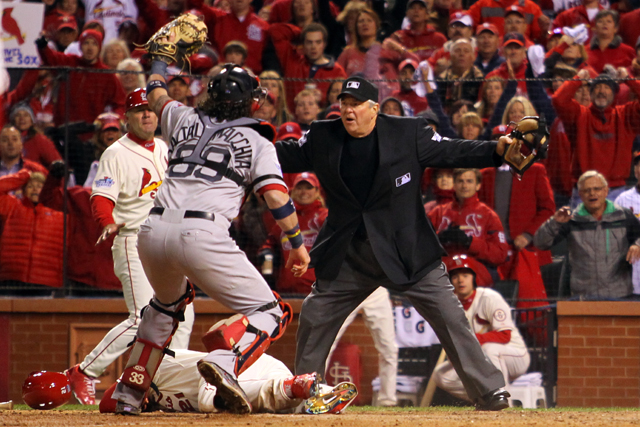
(Getty)
At the bottom of the ninth with one out and runners on second and third, St. Louis Cardinal’s Jon Jay hit a ball to Boston Red Sox’s second baseman Dustin Pedroia. Pedroia caught it and sent home to teammate Yadier Molina.
Molina then sends it to teammate Jarrod Saltamacchia to try to get Allen Craig out, but overthrows the ball far into left field.
Daniel Nava recovers the ball and whips it back home to Molina to try and get Craig out again. It looks good and Craig is out…
But no, the umpire calls obstruction on third baseman Will Middlebrooks for apparently tripping Craig. What do you think? Watch the GIFs of the event unfolding below.




According to MLB rules, the umpire’s call falls under rule 7.06 for “Obstruction.” Fox News reports:
MAJOR LEAGUE BASEBALL RULE 7.06
“(a) When obstruction occurs, the umpire shall call or signal ‘Obstruction.’“If a play is being made on the obstructed runner, or if the batter-runner is obstructed before he touches first base, the ball is dead and all runners shall advance, without liability to be put out, to the bases they would have reached, in the umpire’s judgment, if there had been no obstruction. The obstructed runner shall be awarded at least one base beyond the base he had last legally touched before the obstruction. Any preceding runners, forced to advance by the award of bases as the penalty for obstruction, shall advance without liability to be put out.
“Rule 7.06(a) Comment: When a play is being made on an obstructed runner, the umpire shall signal obstruction in the same manner that he calls ‘Time,’ with both hands overhead. The ball is immediately dead when this signal is given; however, should a thrown ball be in flight before the obstruction is called by the umpire, the runners are to be awarded such bases on wild throws as they would have been awarded had not obstruction occurred. On a play where a runner was trapped between second and third and obstructed by the third baseman going into third base while the throw is in flight from the shortstop, if such throw goes into the dugout the obstructed runner is to be awarded home base. Any other runners on base in this situation would also be awarded two bases from the base they last legally touched before obstruction was called.
“(b) If no play is being made on the obstructed runner, the play shall proceed until no further action is possible. The umpire shall then call ‘Time’ and impose such penalties, if any, as in his judgment will nullify the act of obstruction.
“Rule 7.06(b) Comment: Under 7.06(b) when the ball is not dead on obstruction and an obstructed runner advances beyond the base which, in the umpire’s judgment, he would have been awarded because of being obstructed, he does so at his own peril and may be tagged out. This is a judgment call.
Was it a good judgment call or a bad one? The debate will probably rage for years.
